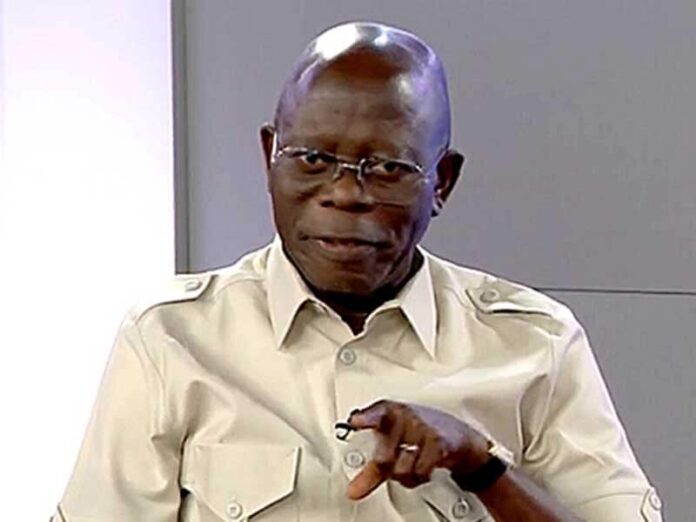In a heated Senate debate on Thursday, Senator Adams Oshiomhole of Edo North vehemently opposed any posthumous recognition for the late Professor Humphrey Nwosu, the former chairman of the defunct National Electoral Commission (NEC). Oshiomhole argued that Nwosu, who oversaw the controversial June 12, 1993 presidential election, failed Nigerians by not officially declaring the winner of the election, which was annulled by then-military ruler Ibrahim Babangida.
The debate began during discussions on a motion sponsored by Senator Enyinnaya Abaribe (Abia South) seeking to recognize Nwosu’s role in Nigeria’s democratic transition. However, Oshiomhole, a former national chairman of the All Progressives Congress (APC), strongly disagreed with this move, stating that Nwosu’s failure to declare the winner of the election, despite having the opportunity to do so, should disqualify him from any posthumous honour.
The June 12 election, which saw the late Moshood Abiola of the Social Democratic Party (SDP) winning by a wide margin, is regarded as the freest and fairest election in Nigeria’s history. However, the military government, led by Babangida, annulled the election, plunging the country into a prolonged political crisis. Abiola’s victory was never officially recognized, and he was later imprisoned and died under suspicious circumstances in 1998.
Oshiomhole’s criticism of Nwosu centers around the fact that, in his view, Nwosu and Babangida deceived the 18 million Nigerians who voted in the election. According to Oshiomhole, Nwosu had an opportunity to reveal the true result of the election after Nigeria’s return to democracy in 1999, but failed to do so.
“Professor Nwosu and President Babangida fooled the 18 million Nigerians who voted,” Oshiomhole said, adding that while the country was under a dictatorship at the time, some individuals still chose to take a stand despite the risks. “If he was afraid of the gun because we were under a dictatorship, some people might say, ‘Well, there were Nigerians who protested under the gun without minding the consequences,’” he stated.
The senator further argued that after the end of Babangida’s military rule, the death of Abiola, and Nigeria’s transition to democracy under President Olusegun Obasanjo, Nwosu had a chance to come forward and correct the historical injustice. “After the end of Babangida’s tenure, the death of Abiola, and the birth of the new democracy that produced President Obasanjo, I would have expected Nwosu to say—either on his birthday or on a special occasion—‘I couldn’t declare these numbers then, but now, on my record, Abiola won this election. I just wasn’t able to announce it,’” Oshiomhole remarked.
Instead, Oshiomhole stated, Nwosu remained silent, and died without acknowledging the truth of the election results. He argued that because of this failure, Nwosu could not be celebrated or recognized for his role in the election. “He died without confession; he cannot be rewarded,” Oshiomhole asserted, emphasizing that history should not be distorted to honor Nwosu posthumously.
The June 12 election has long been seen as a pivotal moment in Nigeria’s history. Despite the annulment, June 12 is now widely recognized as Nigeria’s Democracy Day, and in 2018, President Muhammadu Buhari officially declared it a national holiday in honor of Abiola. The campaign to officially recognize the election as the rightful moment of Nigeria’s democratic birth has gained significant momentum over the years, culminating in posthumous awards to Abiola and others who were part of the struggle.
Oshiomhole’s comments represent a sharp contrast to the views of those who believe Nwosu’s role in overseeing the election should be honored. Many believe that Nwosu, despite the challenges and pressures he faced under a military regime, did his best to oversee the election process fairly, and should be recognized for his contributions to the transition to democracy.
The debate over Nwosu’s legacy also touches on broader questions about the role of individuals in Nigeria’s struggle for democracy and the responsibility of public figures to stand by the truth, regardless of the political consequences. While Nwosu’s supporters argue that he acted under duress and should be celebrated for his role in the electoral process, Oshiomhole and others feel that true courage would have involved declaring Abiola’s victory, even at the risk of personal harm.
The motion to recognize Nwosu was brought forward by Senator Abaribe, who emphasized the importance of acknowledging the contributions of individuals who played significant roles in Nigeria’s democratic journey. Abaribe’s motion sought to honor Nwosu for his role in conducting the 1993 election, despite the tragic outcome of the annulment. He argued that Nwosu’s actions in the face of immense political pressure should not be overlooked.
However, Oshiomhole’s position suggests a more critical perspective on the matter. He believes that recognizing Nwosu without acknowledging his failure to make the election’s true outcome known would be an injustice to the 18 million Nigerians who voted for Abiola, and an affront to the ideals of democracy.
While Oshiomhole’s comments have sparked controversy, they have also brought attention to the complexities surrounding the June 12 election and the people involved in its outcome. The debate raises important questions about the nature of posthumous recognition and whether individuals who did not take a stand when it mattered most should be honored for their actions, or lack thereof.

